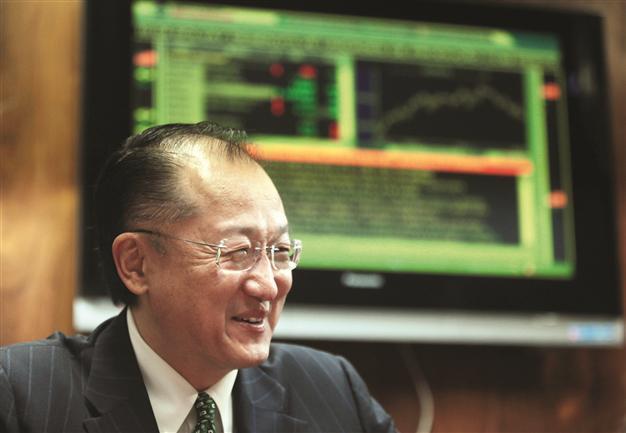US pick set to lead World Bank in face of criticism
WASHINGTON - Agence France-Presse

Jim Yong Kim meets with Brazil’s Economy Minister Guido Mantega, not in picture, in Brasilia, Brazil, on April 5. U.S. physician Jim Yong Kim is President Barack Obama’s
nominee for the next World Bank president. Kim is expected to be become the new World Bank government after a Bank meeting scheduled to be held today. AP photo
Despite an unprecedented challenge from two developing-world candidates, Washington’s 66-year lock on the
World Bank presidency will almost certainly remain intact when directors meet today to fill the post.
Even after one of the challengers dropped out on April 13 to push his support to the other -- Nigerian Finance Minister Ngozi Okonjo-Iweala -- they won’t be able to overcome U.S. and European backing for the U.S. nominee, health expert
Jim Yong Kim, analysts say.
But the first-ever challenge to traditional American control of the job has signaled that, as with the International Monetary Fund, emerging economies are flexing their muscles for a bigger say in how the near seven-decade old institutions are run.
Bank directors say they aim for a consensus decision when they meet formally today to replace current President Robert Zoellick, the former
US diplomat incumbent who is leaving in June at the end of his five year term.
The position is crucial for much of the developing world. The president oversees a staff of 9,000 economists, development experts and other policy specialists, and a loan portfolio that hit $258 billion in 2011.
Last year the bank committed $43 billion to new loans and grants, helping diverse countries to develop infrastructure, administration, and key sectors of their economies.
Bank experts say Zoellick has done a good job to unite a staff who became dispirited under his predecessor Paul Wolfowitz, and credit him with energizing the bank to act during the 2008-2009 financial crisis.
But they also say the institution needs a new direction that matches the requirements of a much-changed global economic landscape. It needs a cohesive vision for the future, according to former bank staffer Katherine Marshall, now a professor of government at Georgetown University.
The race was taken seriously early as the United States appeared unable to find a candidate while Okonjo-Iweala and Colombian economist and former finance minister Jose Antonio Ocampo threw their names into the hat. Both were lauded as viable, with Okonjo-Iweala, who spent some 25 years in various positions at the bank, earning prominent endorsements.
But the White House surprised all with the nomination of Kim. Not a banker or diplomat like the previous Bank presidents, the Korean-American physician is the head of the Ivy League Dartmouth College but is also known for his work on fighting AIDS in developing countries.
“It’s time for a development professional to lead the world’s largest development agency,” President Barack Obama said.
Introduction campaignCritics, however, raised doubts about Kim’s lack of experience across the broad realm of development economics.
But he traveled to around a dozen countries to introduce himself, apparently convincingly enough to earn solid support.
Last week Bank directors interviewed the three candidates on how they aimed to run the Bank, in a process that aimed to show that the choice is made on merit rather than old political arrangements.
That gave rise to some hopes that one of the challengers might have a chance.
Indeed, on Friday as Brazil said that the BRICS emerging economies -- Brazil, Russia, China, India and South Africa -- would back one candidate and Ocampo withdrew and endorsed Okonjo-Iweala, some hoped she might have a fighting chance.
But Russia immediately broke ranks and endorsed Kim, almost guaranteeing that the tradition that Washington names the World Bank head and Europe supplies the leader of the IMF is likely to go unchanged.
“The only way around that is if European countries refuse to back the US candidate. In the current context, it doesn’t seem likely,” said Daniel Bradlow, a law professor at American University in Washington.
But former Bank economist Uri Dadush said the emergence of a competition did count for something.
“Before, when there was only one candidate, the US backing counted for 99 percent and merit for one percent,” he said.
